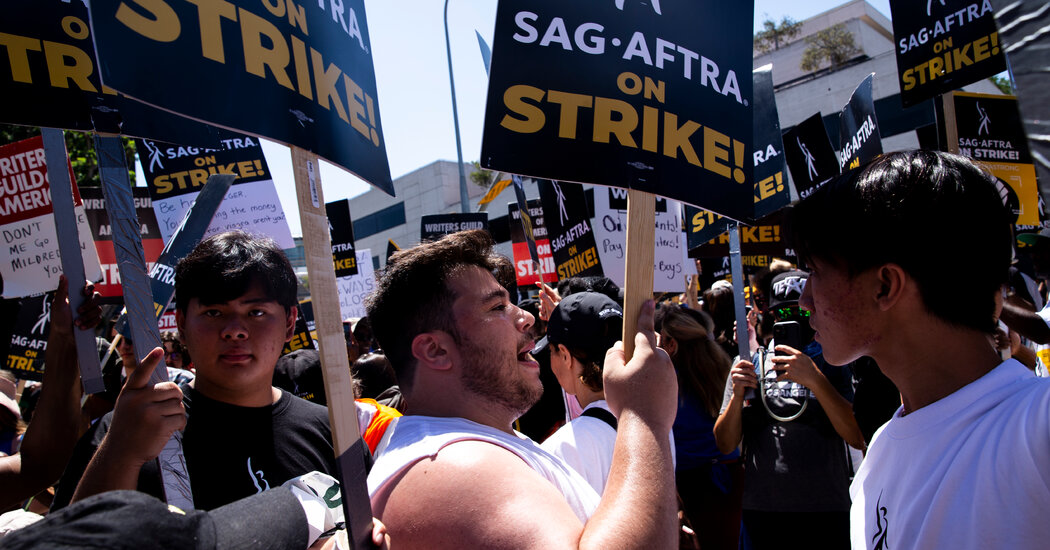
The Writers Guild of America has ended their strike
Production Limits in the 21st Century and the Effect of the Loss of the Theater Box Office in the Hollywood / Motion Picture Industry
In a statement on Sunday night, the actors union said it was looking forward to reviewing the tentative agreement with the studios. It was still committed to achieving the necessary terms for its members.
The actors union and representatives of the Alliance of Motion Picture and Television Producers haven’t been in contact for 74 days. That will probably soon change given the high stakes of salvaging the 2024 theatrical box office, which will be in considerable jeopardy should Hollywood not be able to restart production within the next month. Neither the studio alliance nor the guild responded to questions on Monday.
The dual strikes by the writers and the actors — the first time that has happened since 1960 — have effectively shut down TV and film production for months. The fallout has been significant, both inside and outside the industry. California’s economy alone has lost more than $5 billion, according to Gov. Gavin Newsom.
Warner Bros. Discovery said this month that the impact from the labor disputes would reduce its adjusted earnings for the year by $300 million to $500 million. Additionally, share prices for other major media companies like Disney and Paramount have taken a hit in recent months.
A summary explaining terms of the deal has been posted so that we can see details of their agreement for the first time, as well as the 94-page deal (embedded below) which is scheduled to remain in effect from September 25th, 2023 through May 1st, 2026. There are regulations around the use of generative AI tools and how to calculate bonuses for watching tv, as well as a specific rules about streaming data and how to calculate bonuses.
There’s a new viewership-based bonus structure in place for series and films made for streaming, plus an agreement for the studios to share data with the Guild on the number of hours streamed for projects like Netflix’s original series.
The WGA is the Flashy Thing: Human Streaming, AI-Generated Material and Artificial Intelligence Is the Game-Changing Factor
When it comes to AI, the tools “can’t write or rewrite literary material, and AI-generated material will not be considered source material under the MBA.” Writers cannot be forced to use artificial intelligence software like ChatGPT and they have to be told if any materials they receive were created by artificial intelligence.
For now, we may only see the return of late-night talk shows, such as The Tonight Show Starring Jimmy Fallon and The Late Show With Stephen Colbert, as hosts have a different SAG-AFTRA contract that isn’t included in the strike.
As of midnight, the Writers Guild of America will no longer be picketing. Instead, members of the union will be poring over new details on the contract negotiated with the AMPTP and deciding whether they will vote to ratify this new contract.
On the AI side of things, the WGA got essentially what it’s been demanding from the start. Artificial intelligence won’t be able to write or rewrite literary material, and Artificial intelligence won’t be able to be used as a source material. So an exec won’t be able to ask ChatGPT to come up with a story and ask writers to turn it into a script that the exec owns the rights to.
The writers of the streaming features should see their compensation increase if the film had at least 30 million dollars in budget and a 26 percent increase in residual base.
The legality of exploitation of writer’s material to train artificial intelligence is a topic that the WGA has the right to argue about. If the laws change or the training is changed, the guild will be able to call that exploitation. This is likely related to proposed laws proposed in California regulating the use of materials for training AI.
But “AI is the flashy thing. The director of policy and advocacy at theElectronic Frontier Foundation told me that the data was the game-changing factor.
I tend to agree with it. It was noted by the LA Times that streaming data has been a black hole. The problem is that no one working on projects in Hollywood knew how well they were doing because their pay was directly tied to performance.
And once real actual numbers start circulating, it will be a lot more difficult for streamers to claim a project succeeded when no one you know has ever heard of it or say a show is getting canceled for lack of interest while numbers suggest a different story.
The streaming industry has thrived on data opacity—allowing an industry in the business of fiction to twist the story to how it sees fit with carefully crafted data. Now, there will be real, actual, hard data available to the WGA membership, and once the genie is out of the bottle, it will be a whole lot more difficult to smush it back in.

